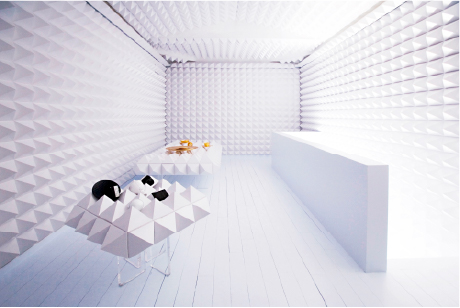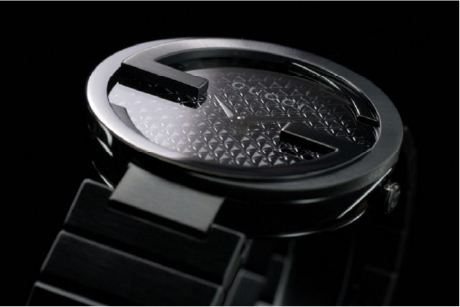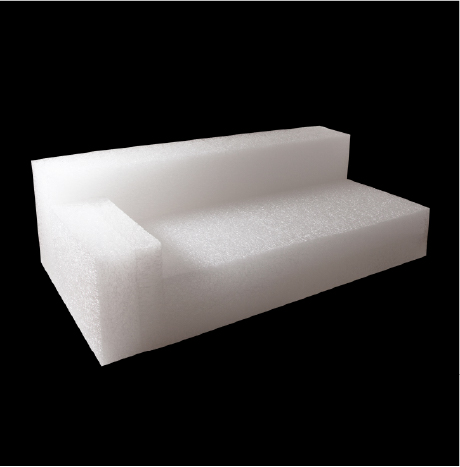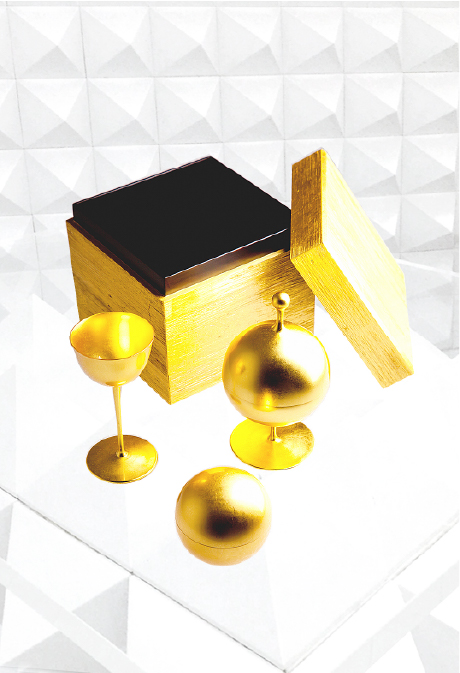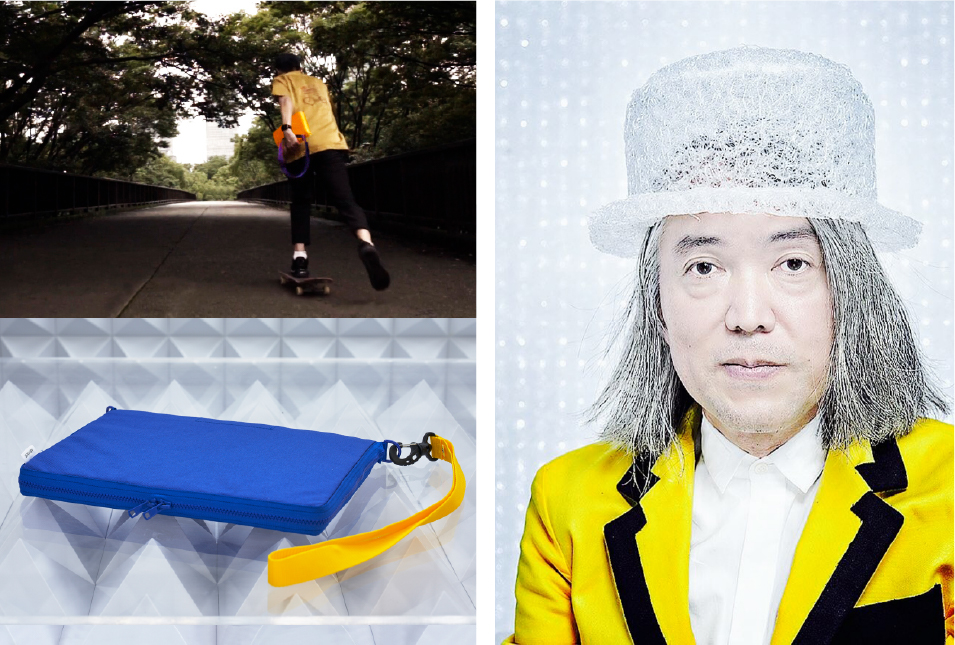Koichiro Kimura
Create the Future of the Tradition
木村浩一郎―伝統の未来を創造する
Koichiro Kimura, who was born in 1963 in Sendai, Miyagi prefecture, inherited the 400-year-old lacquer shop. He is tall, stylish and, once aspired to be a fashion designer, possessed a keen expressiveness that upended the notion of craftsmanship. In order to seek the cooperation with Kimura, the top figures of Nestle, Masson, GUCCI and other world brands successively came to Japan. The key word, Japan, and Kimura’s artistry and originality, which transcend craft, have attracted the world’s elites.
Kimura is also good at using industrial materials far removed from paint, “my work is cheap but cool,” he says. The exhibition hall in Omotesando, Tokyo, is a non-everyday world covered by 4,000 snow-white pyramidal melamine resin parts. The work has been selected by Wallpaper as the world’s store designer, won several awards in Europe and has been included in Japanese junior school art textbooks. Through technical exchanges with various enterprises, the new material MIYAVIE, woven with silk polyethylene resin network structure, has excellent elasticity and comfort, excellent ventilation and water permeability. Sofas and lamps made by MIYAVIE are loved by people from the nursing site to the luxury space. Kimura’s high-end tableware and decorations also received high marks. The glass is shaped by cutting the turbine of an airplane, and the inside is cut by hand of famous craftmen. The highest technology combined with traditional lacquer techniques made the product a popular Japanese gift to foreign guests, and 500 pairs of 500,000 Yen cups were sold well.
The novel sense has a traditional DNA, uninhibited and elegant. Kimura inherited a sharp sense of beauty before Wabi-sabi aesthetic consciousness from the family business inherited from the Momoyama era to the present. Kimura says his work is meaningless if it is considered traditional, must be fresh.” There is no sexy thing without sexy feeling”, the handicraft people in his workshop are not only immersed in production, but also like the Edo era love to have fun and live a way of working full of human interest. Kimura started doing Yoga at 4am every day, grew vegetables on weekends, is interested in everything, full of energy and lived a fresh life. Inheriting the tradition, while destroying it, and create the future of the tradition with new ideas and techniques.
木村浩一郎は1963年宮城県仙台市に生まれ、400年の伝統ある漆器屋を引き継いだ。長身で着こなしもお洒落で、ファッションデザイナーを目指していたその尖った表現力は職人という概念を覆す。木村とのコラボレーションを求めて、ネスレやマイセン、GUCCIなど世界的ブランドのトップから声がかかる。日本というキーワードに加え、木村の技術を超えた芸術性と独創性が、世界のセレブリティたちを惹きつけた。木村は、漆の世界とはかけ離れた工業材料も使いこなす。「僕の作品は、安っぽさがかっこいい。」そう自らの作品を評価する。東京表参道にあるショールームは、真っ白な4000個のピラミッド型メラミン樹脂パーツで覆い尽くされた非日常の世界が広がる。Wallpaperが選ぶ世界のショップデザインに選ばれ、欧州でも多数受賞し、日本の中学校の美術教科書にも掲載された。さまざまな企業とのテクノロジーの交流で生まれた新素材MIYAVIEは、糸状のポリエチレン樹脂による網目構造で、絶妙な反発力と心地良さ、抜群の通気性・通水性を持つ。MIYAVIEでつくられたソファーや照明は、介護の現場からラグジュアリー空間まで広く愛用されている。木村がデザインしたハイブランドのテーブルウェアやアートピースも評価が高く、グラスの作品は、飛行機のタービンを削る技術で形を作り、内部は現代の名工が手作業で削る。最高の技術に伝統的な漆を使った究極な製品は日本の贈り物として喜ばれ、2個1セットで50万円の価格だが500セットが売れた。
新しさの中にDNAに宿る伝統的な感覚を持ち合わせ、クレイジーでエレガントな木村の感性。安土桃山時代から続く家業を継ぐ木村が、侘び寂びの美意識が生まれる以前の、生か死かという鋭利な美の感性を受け継いでいる。木村は「自分の作品が伝統的に見えたら終わり、目指すところは最もフレッシュでないと意味がない。色気がないと色気のあるものは作れない。」と語る。木村のもとで働く職人たちは皆、ただモノをつくるのではなく、江戸時代のように遊びも嗜み、人間味あふれるワークスタイルを過ごすそう。木村自身も、朝4時からヨガを行い、週末には野菜を作り、健康的で人間的な生活を送っている。何にでも興味を持ち、エネルギッシュに、フレッシュに生きる。そして、伝統を継ぎながらその伝統を壊し、斬新な発想と技術で伝統の未来を創造している。
[News / 最新情報]
Kimura is now focusing on product development for the new lifestyle after COVID-19. MIYAVIE has announced the portable cushion square “ANYWAY”, which utilizes the material characteristics that are excellent in body pressure dispersion, for people who remote work and spend a lot of time sitting at desks. “ANYWAY” has excellent cushioning properties and using durable and waterproof cordura nylon, it reduces fatigue, comfortable, light and easy carry, so it can be used comfortably even outdoors such as camping and sports scenes.
木村はいま、アフターコロナを見据えた新しい生活様式に向けたものづくりに力を入れている。テレワークが生活の一部として定着し、デスクなどで座って過ごす時間が多くなる人々のために、MIYAVIEは体圧分散に優れた素材特性を活かした、ポータブルクッションスクエア「ANYWAY」を発表した。優れたクッション性、丈夫で防水性のあるコーデュラナイロンの使用で、疲労軽減や快適さ、軽く持ち運ぶことが容易で、キャンプやスポーツシーン等のアウトドアでも快適に使用することが出来る。
[Photo / 写真]
Lower left / 左下)“ANYWAY” /「ANYWAY」
[Movie / 動画]
https://www.youtube.com/watch?v=f5FwfE63jvc&feature=youtu.be
